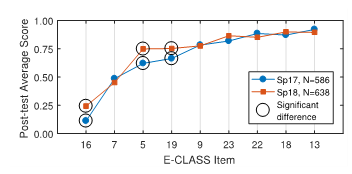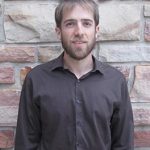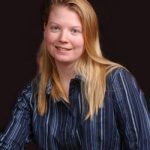Course Transformation Work
PHYS 1140 (Experimental Physics I): PHYS 1140 is a requirement of all physics majors, and is a course that most physical science and engineering majors also take. This course was targeted for transformation due to receiving poor evaluations via multiple standards.
Learning goals were developed for the course, and research-based assessments identified to evaluate them. Student learning after transformation was assessed via pre and post attitudinal surveys, set-like vs point-like reasoning pre and post survey, and through a faculty course questionnaire. Following the above measures (conducted Fall 2017), focus groups, additional post-tests, and a mid-course feedback survey were introduced Spring 2018. Testing of new lab materials was also completed with students, resulting in practical improvements with lab materials, software, and activities.
Results of assessments measuring transformation are available in two papers (listed below), indicating that E-CLASS scores were not improved as a result of the course transformation, and students preferred lab notebooks over lab reports.
2018 Physics Education Research Conference Proceedings: https://www.compadre.org/per/items/detail.cfm?ID=14839
2018 Physics Education Research Conference Proceedings: https://www.compadre.org/PER/items/detail.cfm?ID=14815
Research Highlight

Students views about validating previously known results, measurement uncertainty, and working in groups were more aligned with the expert view after the transformed course compared to the pre-transformed course (2018 Physics Education Research Conference Proceedings, doi:10.1119/perc.2018.pr.Pollard).
Experts
 Dr. Daniel Bolton is an Instructor in the CU Physics Department, primarily working in large introductory courses. His research background is in the field of nuclear theory. Most recently, he worked with Jefferson National Laboratories’ theory group to make a first-principles determination of the masses and widths of pion-pion scattering resonances such as the rho meson. Dr. Bolton may be contacted at daniel.bolton@colorado.edu
Dr. Daniel Bolton is an Instructor in the CU Physics Department, primarily working in large introductory courses. His research background is in the field of nuclear theory. Most recently, he worked with Jefferson National Laboratories’ theory group to make a first-principles determination of the masses and widths of pion-pion scattering resonances such as the rho meson. Dr. Bolton may be contacted at daniel.bolton@colorado.edu
 Dr. Heather Lewandowski’s group studies collisions and reactions of simple cold molecules. Their ultimate goal is to understand the quantum mechanical processes involved in making and breaking a chemical bond. They aim to control the reacting molecules external and internal degrees of freedom in the quantum regime. She also runs a physics education research group focusing on student learning in laboratory courses, particularly at the upper-division level. Dr. Lewandowski may be contacted at lewandoh@colorado.edu
Dr. Heather Lewandowski’s group studies collisions and reactions of simple cold molecules. Their ultimate goal is to understand the quantum mechanical processes involved in making and breaking a chemical bond. They aim to control the reacting molecules external and internal degrees of freedom in the quantum regime. She also runs a physics education research group focusing on student learning in laboratory courses, particularly at the upper-division level. Dr. Lewandowski may be contacted at lewandoh@colorado.edu
